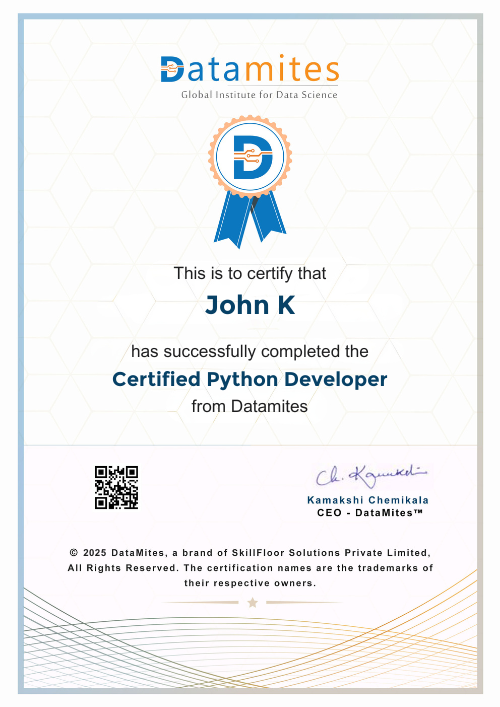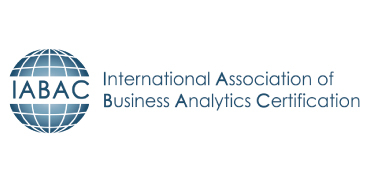Instructor Led Live Online
Self Learning + Live Mentoring
Customize Your Training

• Introduction of python
• Installation of Python and IDE
• Python Variables
• Python basic data types
• Number & Booleans, strings
• Arithmetic Operators
• Comparison Operators
• Assignment Operators
• IF Conditional statement
• IF-ELSE
• NESTED IF
• Python Loops basics
• WHILE Statement
• FOR statements
• BREAK and CONTINUE statements
• Basic data structure in python
• Basics of List
• List: Object, methods
• Tuple: Object, methods
• Sets: Object, methods
• Dictionary: Object, methods
• Functions basics
• Function Parameter passing
• Lambda functions
• Map, reduce, filter functions
• Decorators
• Generators
• Context Managers
• Metaclasses
• Inheritance and Polymorphism
• Encapsulation and Abstraction
• Class methods and static methods
• Special (magic/dunder) methods
• Property decorators - getters, setters, and deletes
• Working with files
• Reading and writing files
• Buffered read and write
• Other file methods
• Logging & Debugger
• Modules and import statements
• SQL Basics
• Creating DB Table
• INSERT, READ, UPDATE, DELETE
• Introduction to MongoDB
• CRUD operations in MongoDB
• namedtuple(), deque, ChainMap,
• Counter, OrderedDict, defaultdict,
• UserDict, UserList, UserString
• Exceptions handling with try-except
• Custom exception handling
• List of general use exception
• Best practice exception handling
• Generators, Iterators
• The Functions any and all
• With Statement
• Data Compression
• A Daytime Server
• Clients and Servers
• The Client and Server Programs
• Classes and Threads
• Multi-threading; thread life cycle
• Regular Expression Syntax
• Group, Split and wildcards
• Quantifiers
• Match, Search and Find all methods
• Character Sequence
• Introduction to OpenCV, Installation
• Basic Operations on Images
• Image Filtering
• Image Classification
• Introduction to GIT
• Basic Git commands
• Introduction to Flask and Installation
• Creating project
• Routing,templates, forms and database integration
• Deployment on render
• Django Introduction and Installation
• Creating a Project
• Django Architecture and File Structure
• Folder Structure, First Django project
• Database and Views, Static Files and Forms
• URL Mapping and Routing
• Defining Models and Relationships
• Database Migrations and Schema Changes
• Querying Data using Django ORM
• Model Forms and Form Validation
• HTML Forms in Django
• Model Forms and Form Validation
• Formsets and Inline Formsets
• File Uploads and Validation
• Deploying Django Applications
• Hosting Options (e.g., Heroku, AWS)
• Project Showcasing and Review
Python is a programming language that emphasizes clear syntax and readability. Its versatility and extensive libraries have made it a popular choice for applications such as scientific computing, machine learning, and web development.
Guido van Rossum created Python in 1991, with the Python Software Foundation taking on the task of developing it. Python's syntax was designed to enable programmers to express concepts using fewer lines of code and with an emphasis on code readability.
Python programming is advantageous to users as it provides a high level of readability, versatility, and flexibility. It also offers a vast number of libraries, which enables users to work with different programming fields such as machine learning, web development, and scientific computing.
Learning Python is generally considered to be a manageable task, thanks to its intuitive and straightforward syntax, which is easy to read and understand. Moreover, the abundance of resources available online, along with a helpful community, makes it an accessible language for beginners.
Python expertise is required for numerous positions, including web developers, software engineers, data analysts, database administrators, business analysts, and artificial intelligence engineers.
No, previous experience is not required to learn Python. Python courses in Jeddah cater to beginners and teach the basics of Python programming, such as variables, data types, and control structures, before advancing to more complex topics such as functions, modules, and object-oriented programming.
The Python training fee in Jeddah is dependent on the level of training that you select. Typically, the fee for classroom/online training falls between 1000 SAR to 3000 SAR.
To learn Python programming, you need technical skills like basic programming knowledge, mathematical and analytical thinking, and logical reasoning. Additionally, essential soft skills such as problem-solving abilities, attention to detail, time management, communication skills, and creativity are necessary.
According to salaryexpert.com, the average python developer salary in Jeddah is SAR 199,141 per annum.
Yes, obtaining Python certification in Jeddah can significantly improve your career prospects. It can demonstrate your expertise in the language, making you an appealing candidate for employers across multiple industries. This can lead to better job opportunities, higher salaries, and improved job stability. Additionally, Python certification can enhance your professional credibility and reputation, potentially opening up new career paths and opportunities for growth.
The duration of the Python training in Jeddah is contingent on the specialization you choose. Typically, the course takes between 2 to 4 months to complete. The training is available on both weekdays and weekends, allowing you to select the batch that best fits your schedule. The Python Developer Course in Jeddah lasts for 4 months.
DataMites is a viable choice for studying Python programming in Jeddah. The institute provides a wide range of course materials, skilled instructors, and flexible scheduling options, equipping students with the knowledge and skills necessary for a successful career in Python programming.
The Python Training fee at DataMites in Jeddah varies depending on the mode of training you choose. The Python Course Fees range from 994 SAR to 1820 SAR, while the Certified Python Developer Training Fees range from SAR 1228 to SAR 2840, depending on the mode of training you opt for.
No, DataMites does not offer offline Python training in Jeddah. However, we have an online Python training program.
The Flexi-Pass for Python training at DataMites is a 3-month program that provides students with access to additional training resources for any queries or revisions beyond the standard course duration.
Yes, DataMites provides an IABAC® certification upon successfully completing our Python training program in Jeddah, which demonstrates your expertise in Python programming and is recognized globally.
Yes, we offer supplementary help sessions to Python training students who require a better understanding of certain topics. Our trainers are available to provide guidance and support to help you learn.
DataMites accepts different payment modes for the Python Training Online in Jeddah, including Cash, Net Banking, Check, Debit Card, Credit Card, PayPal, Visa, Mastercard, and American Express.
Upon completion of the Python course, you can receive a Course Completion Certificate from DataMites.
We ensure that the Python training courses in Jeddah is conducted by expert trainers who are certified, experienced, and proficient in the subject matter.
The DataMites Placement Assistance Team(PAT) facilitates the aspirants in taking all the necessary steps in starting their career in Data Science. Some of the services provided by PAT are: -
The DataMites Placement Assistance Team(PAT) conducts sessions on career mentoring for the aspirants with a view of helping them realize the purpose they have to serve when they step into the corporate world. The students are guided by industry experts about the various possibilities in the Data Science career, this will help the aspirants to draw a clear picture of the career options available. Also, they will be made knowledgeable about the various obstacles they are likely to face as a fresher in the field, and how they can tackle.
No, PAT does not promise a job, but it helps the aspirants to build the required potential needed in landing a career. The aspirants can capitalize on the acquired skills, in the long run, to a successful career in Data Science.



